DevOps is transforming software development, blending operations teams with developers to streamline the software development process. This DevOps methodology ensures smoother collaboration, faster software product delivery, and reduced software development life cycle delays. As the growing popularity of DevOps continues, interview preparation becomes vital. Mastering DevOps interview questions enables candidates to excel in technical interviews and demonstrate expertise in infrastructure management, continuous integration, and automation testing.
Aloa leverages a robust project management framework as a software agency to deliver superior software products. With the help of AWS and a network of vetted partners, we guide clients through secure development processes. Our expertise spans infrastructure management, continuous delivery pipelines, and shared repository optimization. Aloa ensures clients benefit from best practices, from version control to automation testing, across every stage of their development environment.
Building on proven strategies, this blog explores key aspects of DevOps interview questions. We’ll cover understanding DevOps basics, essential tools and technologies, and practical applications in DevOps in practice. You’ll also learn about troubleshooting and problem-solving and how to succeed in preparing for DevOps interviews. By the end, you'll grasp key components of product development and confidently navigate technical interview questions.
Let's begin!
Fundamental DevOps Interview Questions
DevOps focuses on collaboration between development and operations teams to enhance software delivery and quality. Fundamental DevOps interview questions test knowledge of basic principles like the software development lifecycle, continuous integration, and configuration management. Here are the essential questions to help you demonstrate your understanding of the DevOps methodology.
1. What is DevOps, and why is it important?
DevOps is a software development methodology that combines development and operations teams to improve collaboration and streamline workflows. This practice aims to align the development team's efforts with operational processes, ensuring smooth product delivery. The methodology emphasizes continuous deployment, automation, and shared responsibility throughout the software development lifecycle.
Here are the benefits of adopting DevOps:
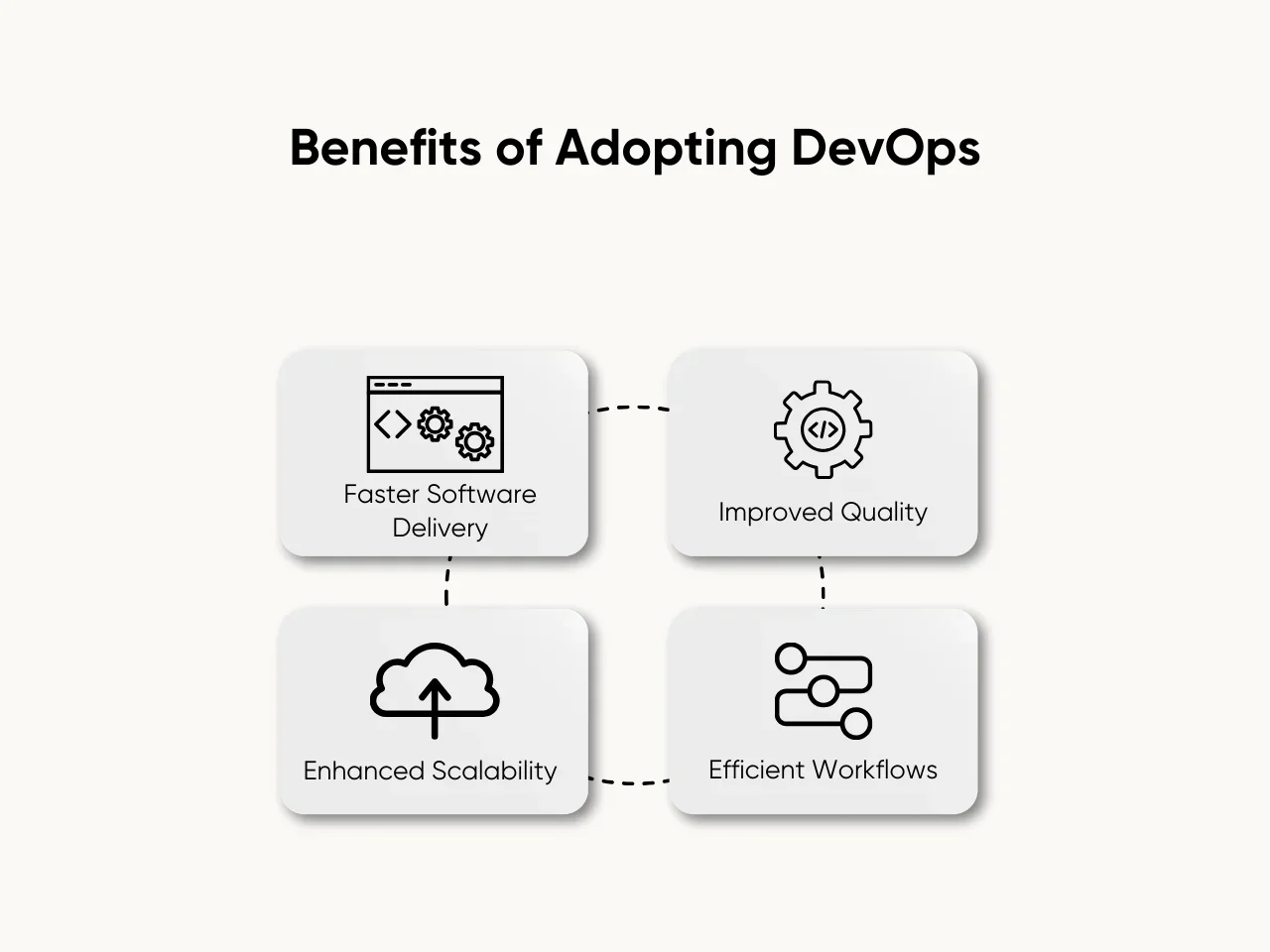
- Faster Delivery of Software Products: Automating release branching, using git repositories, and implementing configuration management tools help speed up deployments.
- Improved Quality: Practices like continuous testing ensure minimal failure rates and faster identification of bug fixes in earlier stages.
- Enhanced Scalability: Leveraging cloud providers like Amazon Web Services ensures robust IT infrastructure for scaling web applications.
- Efficient Workflows: Tools like Docker Swarm and Selenium IDE allow software developers to test and deploy new features efficiently.
DevOps uses powerful tools like Git to manage local and remote Git repositories. Teams use commands like git pull, git fetch, and git merge to manage the develop branch and prepare for the next release cycle. For example, a CI/CD pipeline improves production environment stability, ensuring web browsers run applications seamlessly with minimal failure rates. Post-mortem meetings help review fundamental differences in workflows, enhancing future processes.
2. What are the key principles of DevOps?
DevOps focuses on bridging the gap between development and operations teams. Its principles improve collaboration and streamline workflows for faster and more efficient software delivery. These principles form the foundation of every DevOps practice, ensuring smooth integration across teams. Understanding these principles is crucial to answering DevOps interview questions effectively.
Here are the core principles of DevOps:
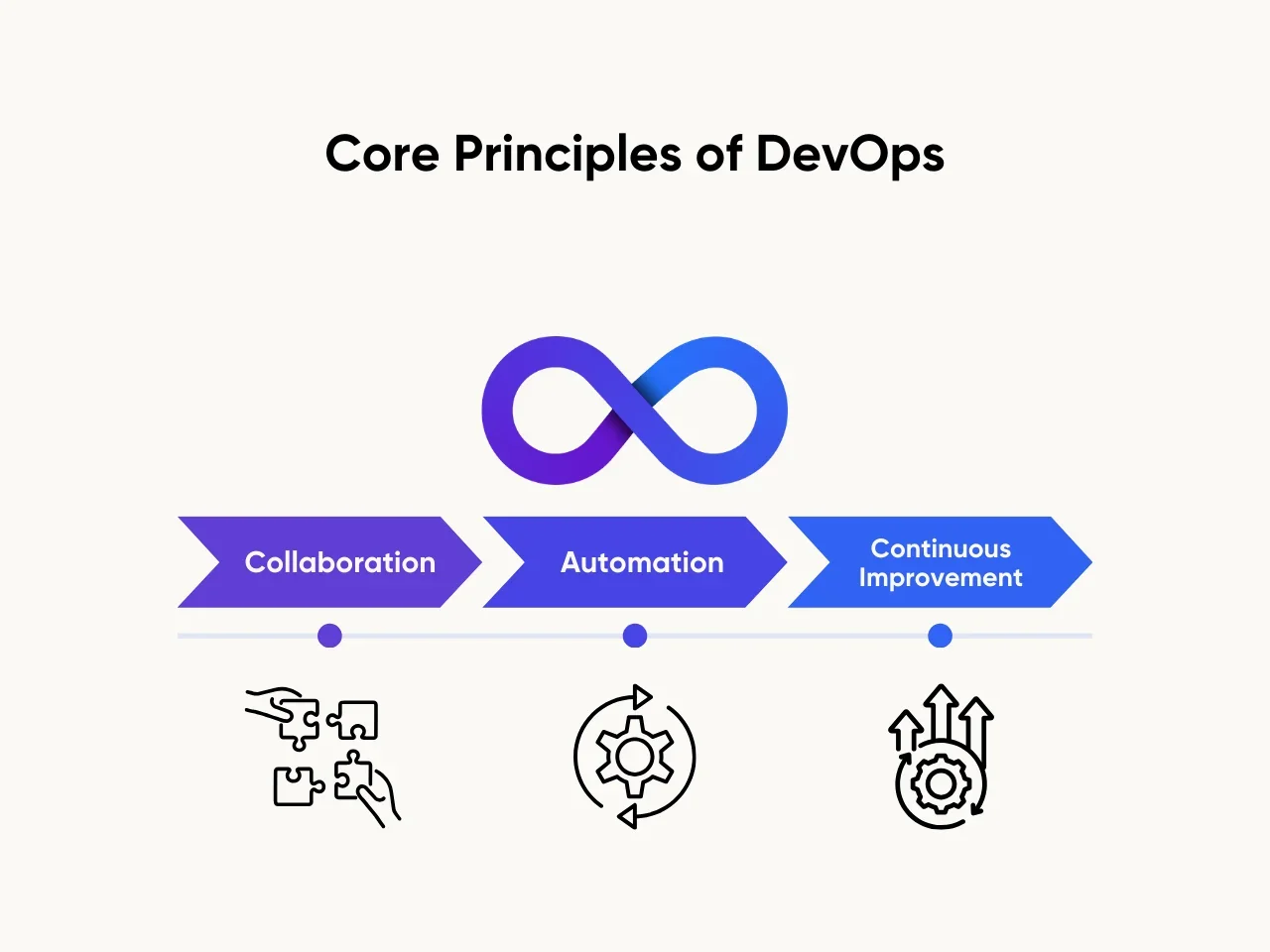
- Collaboration: Teams work together seamlessly, breaking silos and fostering shared responsibility. This approach enhances communication and problem-solving during development cycles.
- Automation: Automation streamlines manual processes. This reduces errors and accelerates workflows, enabling consistent and reliable software releases.
- Continuous Improvement: Teams adopt iterative enhancements to optimize workflows. Regular updates ensure the system evolves to meet new challenges and requirements.
These principles create a robust framework for successful DevOps practices. For instance, integrating automated testing during the development lifecycle identifies issues early. This proactive approach ensures higher-quality software and a smoother delivery pipeline. Mastering these principles will help you confidently address DevOps interview questions and showcase your understanding of the methodology.
3. What is the difference between Agile and DevOps?
Agile and DevOps share a common goal of delivering high-quality software faster. Both methodologies focus on improving processes and enhancing collaboration within teams. However, their approaches differ in scope and execution. Agile primarily centers around development practices, while DevOps extends beyond development to include operations and infrastructure.
Here are the key differences between Agile and DevOps:
| Aspect | Agile | DevOps |
| Focus | Iterative development and customer feedback | Development, deployment, and operational stability |
| Scope | Development processes | Development and IT operations |
| Team Structure | Small, cross-functional teams | Unified collaboration between Dev and Ops |
| Goal | Faster feature delivery | Faster, reliable software deployment |
Agile emphasizes iterative development cycles or sprints to deliver features rapidly and gather feedback. DevOps complements Agile practices by ensuring seamless deployments and stable infrastructure. For example, Agile teams might focus on completing a sprint to release a new feature, while DevOps teams ensure this feature deploys smoothly into production using CI/CD pipelines. Together, these methodologies streamline software delivery and enhance organizational efficiency.
Tools and Technologies in DevOps
Mastering tools and technologies is vital for DevOps roles. Expect DevOps interview questions on popular tools like Git, Docker, and Jenkins, covering version control, automation testing, and infrastructure management. Here are the top questions that assess your familiarity with these tools and their role in the software development process.
4. What are the most commonly used DevOps tools, and what are their purposes?
DevOps thrives on tools that streamline workflows and foster collaboration between teams. These tools support automation, integration, and deployment, enabling smoother software development and operations processes. Understanding these tools is essential for tackling DevOps interview questions, as they form the backbone of efficient DevOps practices.
Here are the most commonly used tools in DevOps and their purposes:
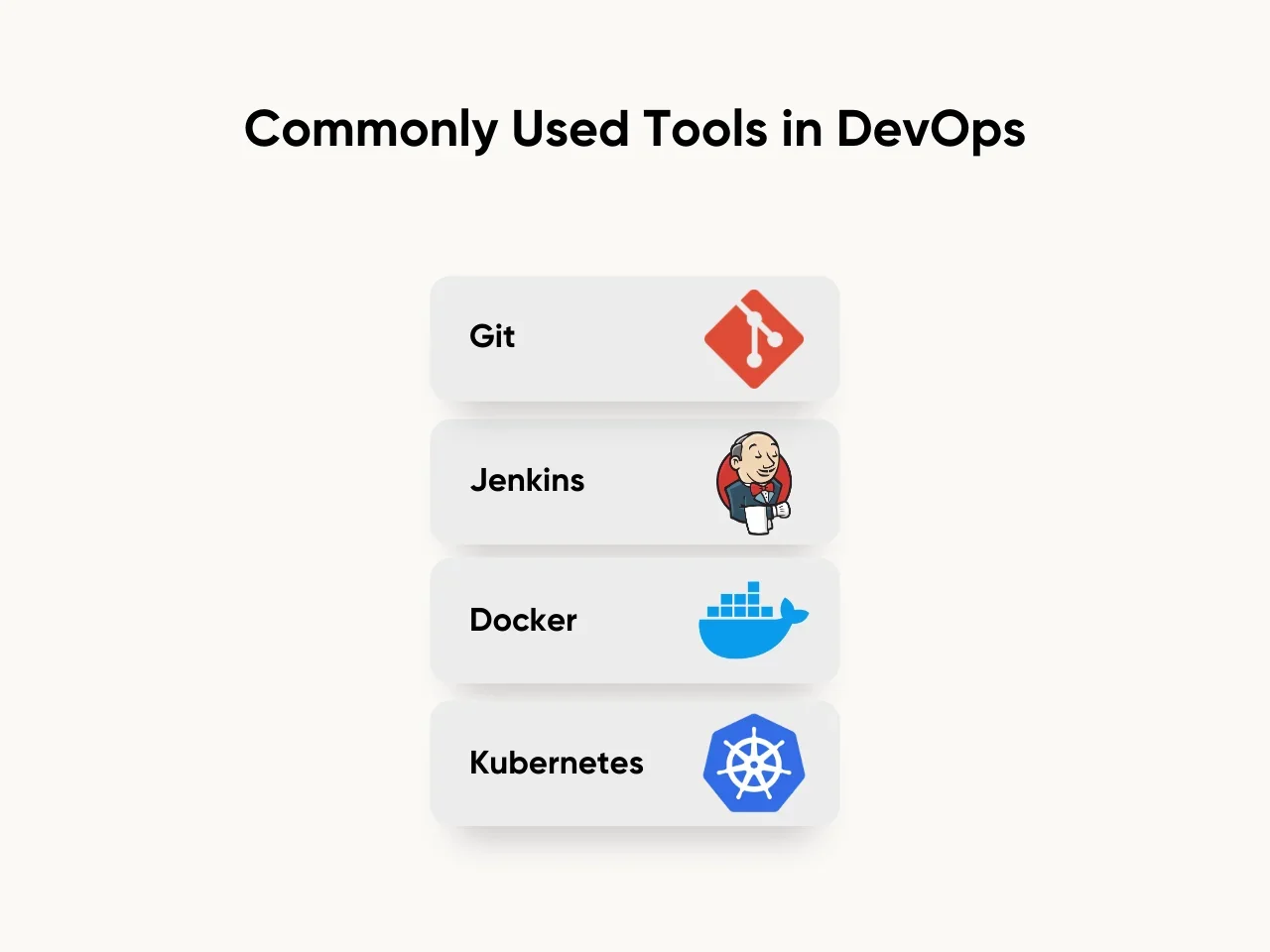
- Git: Manages version control, helping teams track code changes and collaborate effectively.
- Jenkins: Automates tasks for continuous integration and delivery (CI/CD), simplifying build and deployment processes.
- Docker: Provides containerization to package applications and dependencies for consistent environments.
- Kubernetes: Handles container orchestration, managing the deployment and scaling of applications across clusters.
Familiarity with these tools demonstrates readiness to handle complex DevOps tasks. Employers often assess knowledge of these technologies during DevOps interview questions. Mastering their functions and practical applications equips candidates to succeed in interviews and real-world scenarios.
5. What is CI/CD, and why is it important in DevOps?
Continuous Integration (CI) involves frequently merging code changes into a shared repository, with automated testing ensuring the new code integrates seamlessly. Continuous Delivery (CD) extends CI by automating the release of tested code to staging or production environments. Together, CI/CD enhances collaboration and streamlines the development lifecycle.
CI/CD brings faster deployments, fewer errors, and consistent workflows, making it vital for modern DevOps practices. Tools like Jenkins or GitHub Actions automate testing and deployment processes, reducing manual effort. For example, CI/CD pipelines can deploy code to a staging environment immediately after passing all tests, ensuring quick and reliable releases.
6. What is Infrastructure as Code (IaC), and how does it work?
Infrastructure as Code (IaC) transforms how teams manage and provision infrastructure. Instead of manual configurations, IaC uses code to define and automate the setup of servers, networks, and other infrastructure components. This approach ensures consistency, repeatability, and faster deployments, making it an essential topic in DevOps interview questions.
Common tools used in IaC include:
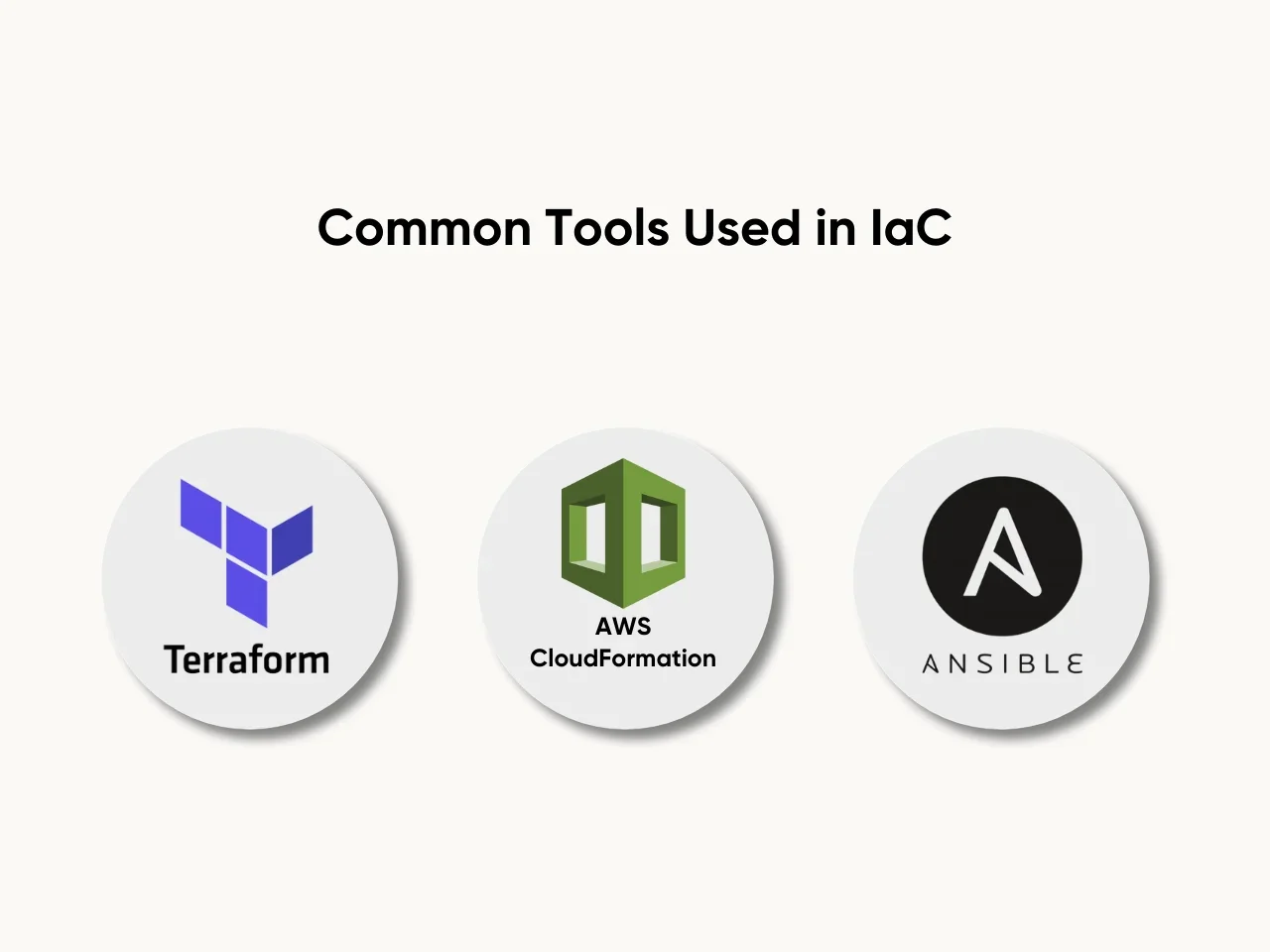
- Terraform: Simplifies cloud resource provisioning through declarative configuration files.
- AWS CloudFormation: Automates AWS infrastructure setup using JSON or YAML templates.
- Ansible: Manages infrastructure and application configurations through automation scripts.
IaC eliminates the risks of manual errors, accelerates infrastructure setup, and aligns infrastructure management with modern DevOps practices. Understanding its tools and applications prepares you to confidently address DevOps engineer interview questions and excel in managing scalable environments. Mastering IaC ensures efficient infrastructure handling and strengthens your skills for real-world DevOps scenarios.
DevOps in Practice
The practical application defines success in DevOps. Interviewers often ask DevOps interview questions related to building CI/CD pipelines, using shared repositories, and optimizing development environments. The questions are designed to evaluate how well you integrate DevOps practices into real-world product development scenarios.
7. How does version control work in DevOps?
Version control tracks and manages changes to code, ensuring developers collaborate seamlessly. It allows teams to maintain a history of modifications, revert to previous versions, and resolve conflicts during collaborative development. Version control is a cornerstone of DevOps, enabling teams to work on the same codebase while minimizing risks of overwrites or errors.
For example, tools like Git help manage feature branches, allowing developers to work independently on specific features. Changes are later reviewed and merged into the main branch through pull requests, ensuring a streamlined and controlled development process. This practice supports efficient workflows, making it a critical skill to address in DevOps interview questions. Understanding version control is vital for success in modern software development.
8. What is a container, and how is it different from a virtual machine?
Containers are lightweight and portable environments designed to run applications consistently across various systems. They encapsulate the application and its dependencies, ensuring seamless execution regardless of the underlying infrastructure. Containers have become essential in modern DevOps workflows, often appearing in DevOps interview questions for their efficiency and adaptability.
Differences between containers and virtual machines (VMs):
- Operating System: Containers share the host OS kernel, while VMs run their own full OS instances.
- Resource Usage: Containers require fewer resources and are more efficient. VMs consume more resources due to their complete OS setups.
- Startup Time: Containers start quickly, enhancing development and deployment speed. VMs take longer to boot.
A DevOps team might deploy microservices using Docker containers. Each container houses a specific microservice, allowing independent scaling and deployment without affecting other services. Understanding these differences and practical use cases, like deploying Docker containers, showcases technical knowledge.
9. What are the main components of a CI/CD pipeline?
A CI/CD pipeline is key in automating the development process. It ensures that code moves smoothly from initial development to production. Efficient pipelines reduce manual work, prevent errors, and speed up deployment. Companies rely on these pipelines to improve workflow consistency and maintain high-quality software releases.
Here are the main components of a CI/CD pipeline:
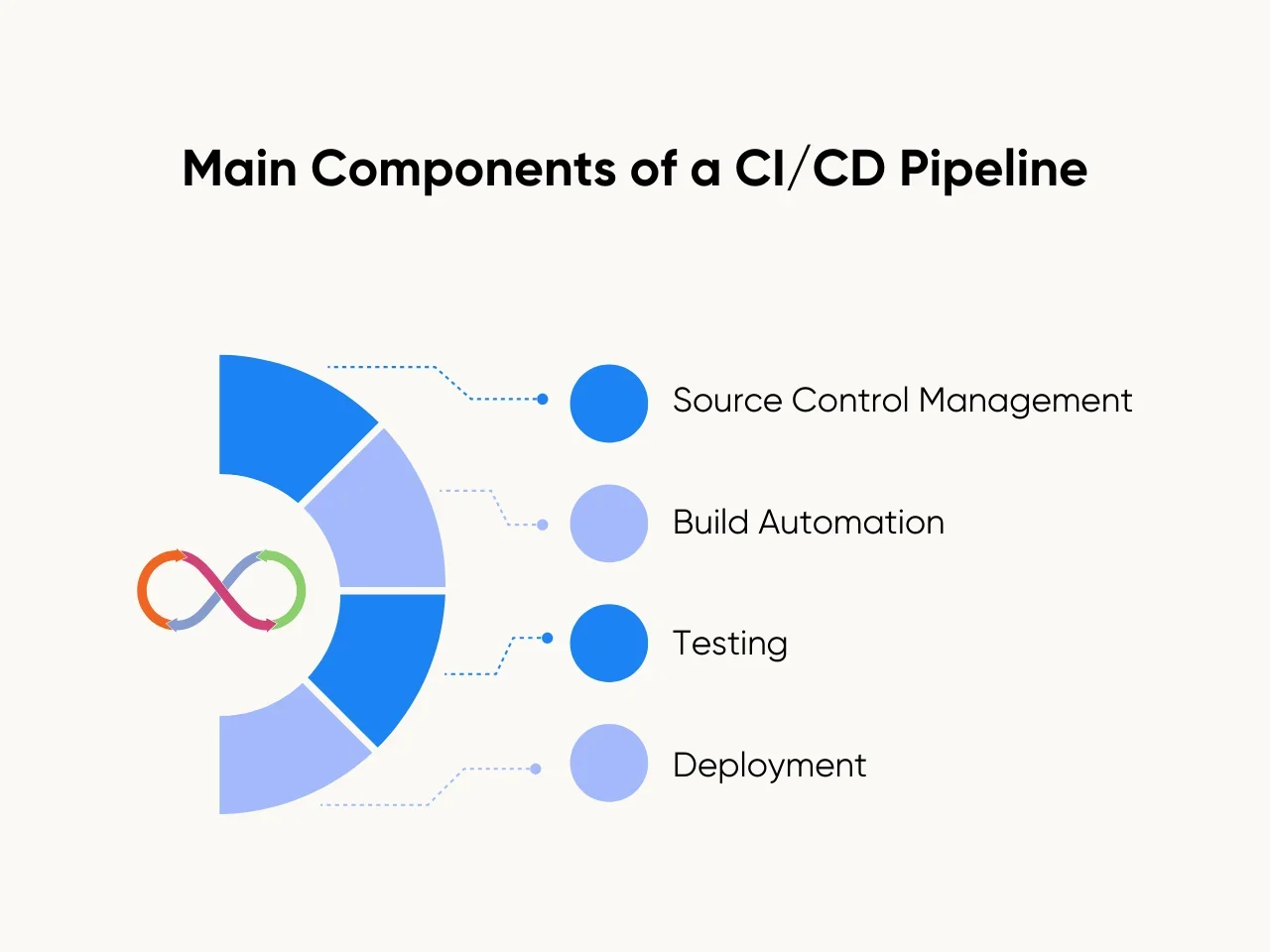
- Source Control Management (SCM): Tools like Git manage and track code changes, enabling teams to collaborate effectively. Repositories act as the foundation where developers push updates and initiate builds.
- Build Automation: Tools like Jenkins or CircleCI compile code into executable formats. This stage ensures that the build process is consistent and error-free.
- Testing: Automated test suites verify code quality, catching bugs early in the development cycle. These tests include unit, integration, and functional testing to maintain application stability.
- Deployment: Code moves seamlessly to staging or production environments. This stage uses tools to ensure error-free releases and scalable deployments, often leveraging Kubernetes.
Mastering these components helps maintain efficiency throughout the software development lifecycle. Each element contributes to smooth operations and reliable releases. Familiarity with CI/CD pipelines also demonstrates practical skills during interviews, aligning with common DevOps engineer interview questions.
Troubleshooting and Problem Solving in DevOps
Problem-solving is crucial in DevOps, from fixing bugs to preventing cache stampedes. Expect DevOps interview questions on handling failed builds, conducting post-mortem meetings, and maintaining high availability. Let's explore the key questions demonstrating your ability to troubleshoot and optimize software systems effectively.
10. How do you handle a failed CI/CD pipeline build?
Handling a failed build requires a structured approach to prevent delays and maintain workflow efficiency. A failed build often indicates issues like coding errors or configuration problems. Addressing these issues ensures the pipeline continues running smoothly. Below are the steps to resolve a failed build:
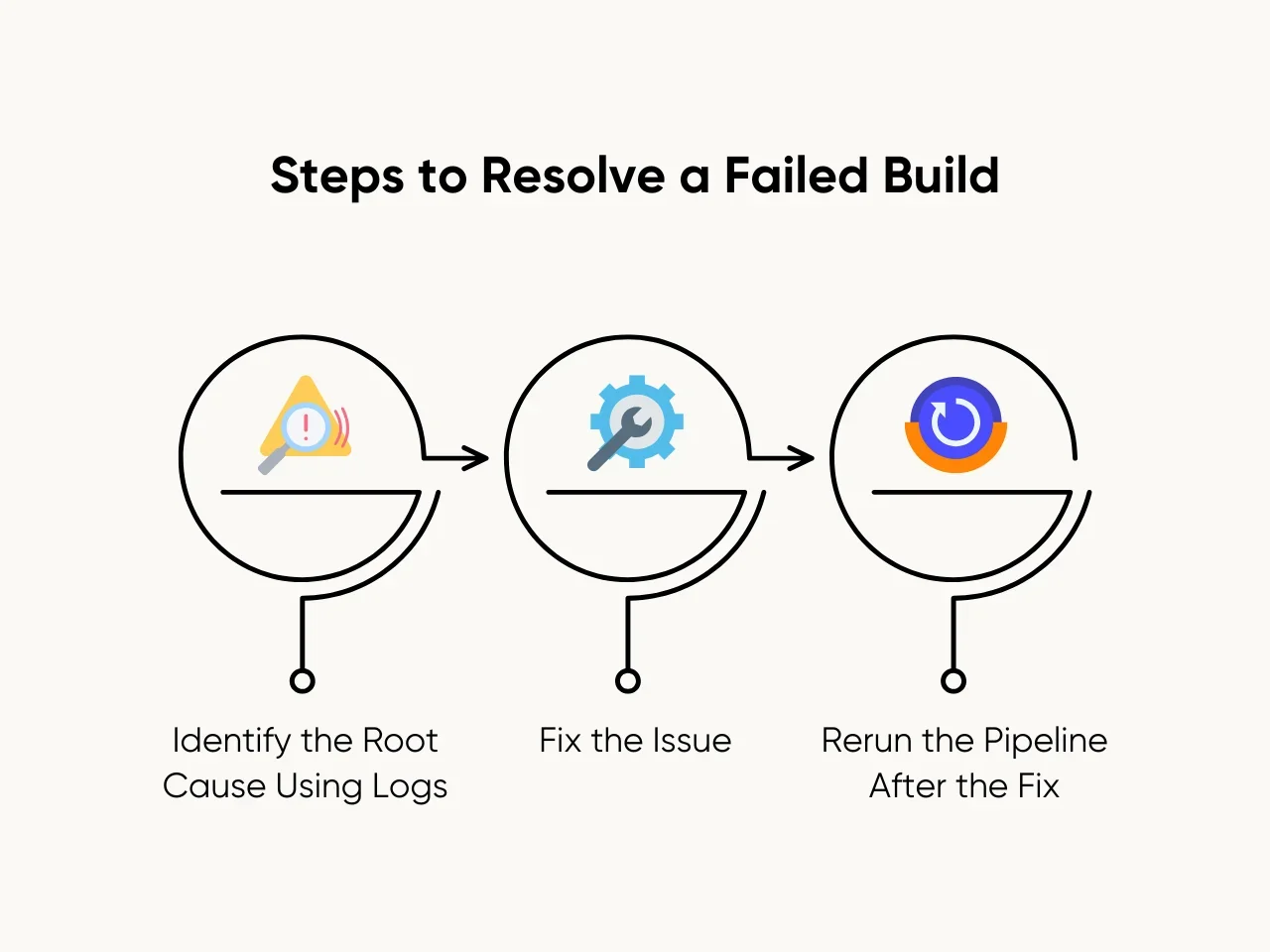
- Identify the Root Cause Using Logs: Examine the build logs to pinpoint where the error occurred. Logs provide insights into coding mistakes, missing dependencies, or misconfigurations.
- Fix the Issue: Resolve the identified problem. This may involve correcting code errors, resolving dependency mismatches, or adjusting configurations.
- Rerun the Pipeline After the Fix: Restart the pipeline to confirm that the changes resolved the issue and that the build has succeeded.
If a build fails due to missing environment variables in a Dockerfile, update the configuration with the correct values and rerun the build. The logs will confirm if the issue is resolved. Maintaining a systematic process for handling failures enhances team efficiency. Each resolved error strengthens the pipeline, reducing the chances of recurring issues. A robust pipeline ensures reliable software delivery and higher productivity.
11. What is monitoring in DevOps, and why is it important?
Monitoring in DevOps tracks system performance and application health, ensuring systems operate efficiently and reliably. It identifies potential issues early, preventing downtime and performance degradation. Continuous monitoring helps teams maintain stable environments and deliver seamless user experiences.
These are the tools commonly used in monitoring:
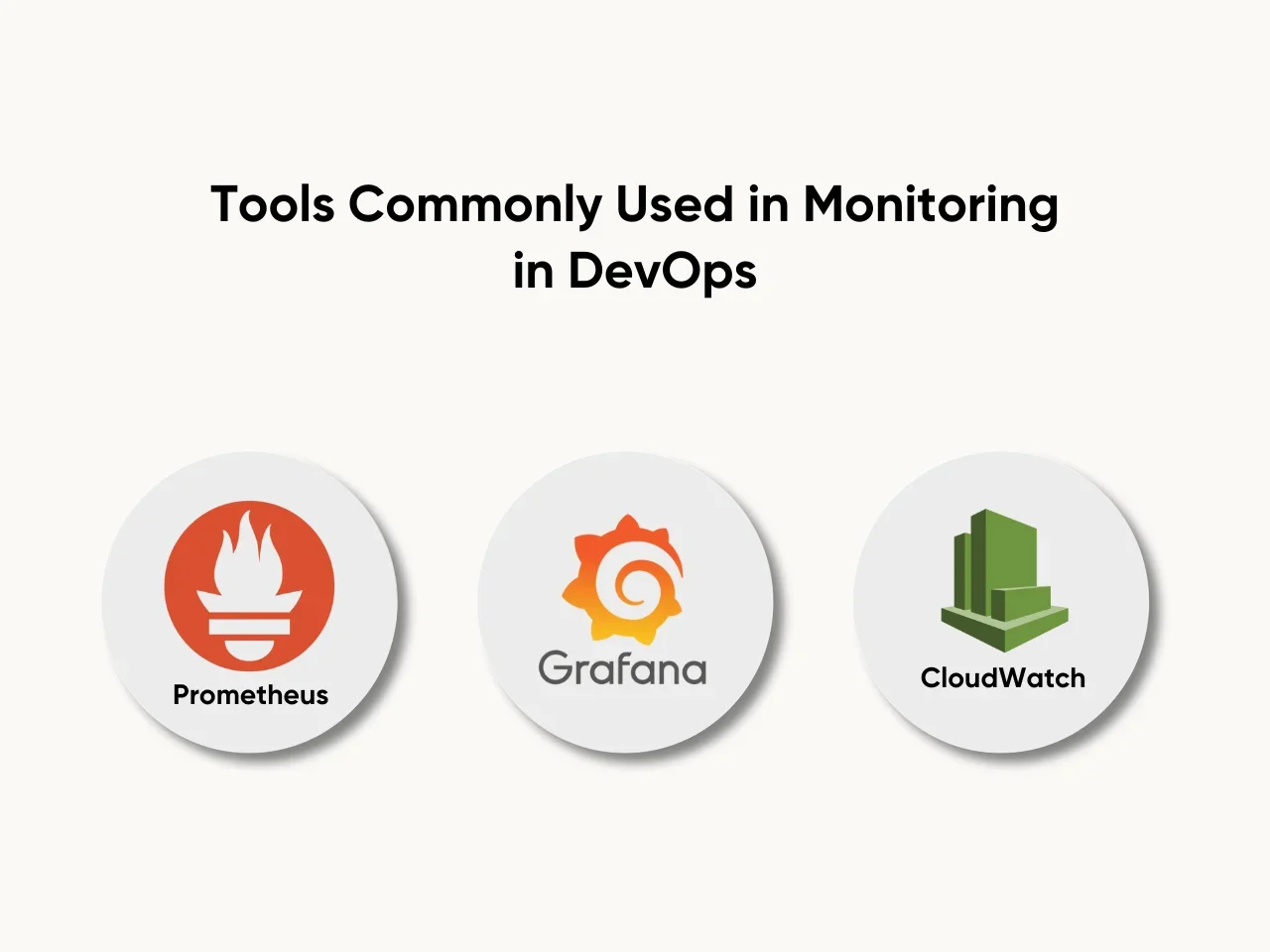
- Prometheus: Gathers and stores metrics, offering detailed insights into system activities.
- Grafana: Creates customizable dashboards to visualize data and improve decision-making.
- CloudWatch: Monitors metrics in cloud environments, enabling proactive responses to performance anomalies.
Alerts for CPU usage spikes prevent application downtime. When CPU usage exceeds a predefined limit, the system notifies the team, allowing them to address the issue promptly and avoid service interruptions. Monitoring is essential for maintaining operational stability and optimizing performance. With effective monitoring, DevOps teams can ensure systems meet user expectations and remain resilient under varying loads.
Preparing for DevOps Interviews
Preparation builds confidence in tackling technical interview questions. DevOps interviews focus on soft skills, system administrators' tasks, and secure processes like SSH protocol. Here are the DevOps interview questions to prepare for, ensuring you excel in explaining your role, tools, and contributions during team member evaluations.
12. What should you focus on as a beginner in DevOps?
Beginners in DevOps should prioritize understanding its core principles, such as collaboration, automation, and continuous improvement. Learning foundational workflows like version control, CI/CD pipelines, and infrastructure as code lays the groundwork for advanced concepts. These basics prepare you for hands-on tasks and help you confidently tackle DevOps interview questions.
Hands-on experience with tools like Git for version control, Jenkins for CI/CD, Docker for containerization, and Terraform for infrastructure automation is essential. For example, creating a simple CI/CD pipeline for a sample application helps demonstrate technical skills while reinforcing practical knowledge of DevOps workflows.
13. How do you explain your DevOps projects in an interview?
Clarity and structure are key when discussing DevOps projects in an interview. Your explanation should highlight your problem-solving abilities, technical expertise, and teamwork. Recruiters want to understand how you contributed to the project and the impact of your work. Framing your explanation with a structured approach ensures you deliver concise and impactful answers. Here’s how to craft a strong response:
- Problem Statement: Start with an overview of your team's issue or challenge. For instance, "The deployment process was slow and error-prone, causing delays in product releases."
- Your Role and Contribution: Clearly define and explain your responsibilities, whether you designed CI/CD pipelines, automated workflows, or managed version control. For example, "I led the implementation of Jenkins to automate our build and deployment processes."
- Tools and Technologies Used: Mention the tools you utilized, such as Git, Docker, Kubernetes, or Terraform. Emphasize why you chose them and how they addressed the problem.
- Results and Lessons Learned: Conclude with measurable outcomes. Highlight improvements, such as reduced deployment times or fewer errors, and share key takeaways from the experience. For example, "The automation reduced deployment time by 50%, and I learned the importance of thorough testing in CI/CD pipelines."
Using this structure ensures your explanation is concise, impactful, and relevant. It also showcases your ability to identify challenges, take ownership, and deliver measurable results—key qualities for any DevOps role.
Key Takeaway
DevOps interview questions assess candidates' ability to integrate development and operations processes seamlessly. It focuses on technical knowledge, problem-solving skills, and adaptability in dynamic environments. Understanding infrastructure automation, CI/CD pipelines, and cloud platforms often forms the foundation for evaluating candidates during these interviews.
A strong foundation in software development methodologies is crucial for success in DevOps interviews. This knowledge effectively manages continuous integration, delivery, and deployment pipelines. The goal is to ensure seamless alignment between organizational objectives and technical execution.
Are you ready to tackle challenging DevOps interview questions? At Aloa, we help you stay updated on the latest technologies in software development. Our expertise ensures you gain the skills needed to stand out in today’s competitive job market. Let’s simplify your journey to success.

.webp)